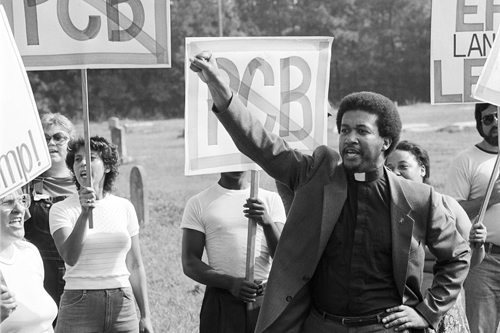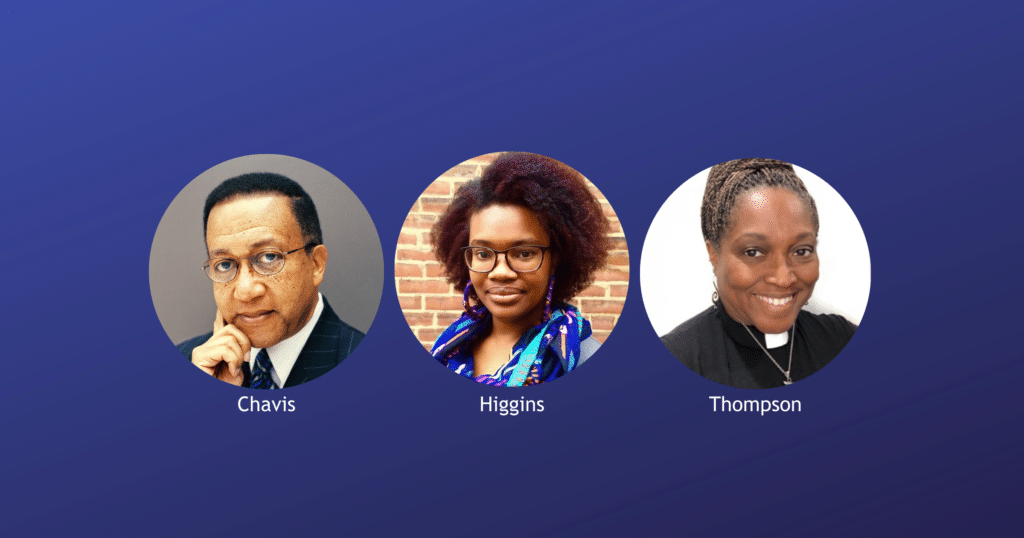Synod’s virtual pulpit to feature national, local, global perspectives
This the first in a series of three profiles of the ministers who will preach during the 33rd General Synod of the United Church of Christ, July 11-18. This “Special Edition General Synod” will be the first to be held entirely online.
National, local, global — and overlapping.
That’s one way to think of the three voices preaching from the virtual pulpit of this summer’s General Synod:
- The Rev. Benjamin F. Chavis Jr., civil rights activist, Sunday, July 11, at 5 p.m. EDT.
- The Rev. Michelle Higgins, pastor St. John’s UCC (The Beloved Community), St. Louis, Wednesday, July 14, at 8 p.m. EDT.
- The Rev. Karen Georgia Thompson, associate general minister for Wider Church Ministries, Sunday, July 18, at 6 p.m. EDT.
Their ministries have included:
- Going to prison for racial justice work with the UCC.
- Leading an historic environmental justice study.
- Becoming the first Black female pastor of a church with German Evangelical roots.
- Blending Pentecostal passion with radical inclusion.
- Representing the UCC to global church partners and church councils.
- Being the first Caribbean American officer of the UCC.
They will preach at the start, middle and end of the event. Online worship services will be available to the public as well as to those who have paid to register for the Synod. People wishing to sign up free, for the worship services only, can watch the General Synod website for details.
Wilmington 10 and the UCC
Chavis will preach some 50 years after he and nine other North Carolina civil rights activists caught the world’s attention. He said he now looks back on what followed as “one of the proudest moments of the United Church of Christ as a Protestant denomination in America.”
The Wilmington 10, as they came to be known, were wrongly convicted in 1972 of arson and conspiracy after deadly racial conflicts in 1971. Chavis, a staffer with the UCC’s Commission for Racial Justice, received a 34-year sentence. CRJ came to their defense. The 1977 General Synod, meeting in Washington, D.C., held a march to the White House for their release. Their sentences were commuted in 1978 and their convictions overturned in 1980. Finally, in 2013, the state’s governor pardoned them.
“We were able to bear witness to the call for equal justice and an end to racial discrimination,” Chavis said. “The racial justice ministry of the United Church of Christ 50 years ago was at the center of who we declared through faith to be as a church. I believe it is time to reassert that declaration.”
Environmental justice

Fighting injustice in Wilmington — and his earlier work as a youth organizer in North Carolina for the Rev. Martin Luther King Jr. — were just the start of Chavis’ ministry in the public eye.
Resuming CRJ staff work, he led protests against toxic waste dumping in Warren County, N.C., in 1982. He then served as executive director of CRJ (now part of Justice and Local Church Ministries) from 1985 to 1993.
The Commission’s work in those years included:
- A groundbreaking report, Toxic Wastes and Race in the United States. It is still cited by environmental-justice scholars.
- A Pastoral Letter on Contemporary Racism and the Role of the Church, a UCC first.
- Leadership in the first National People of Color Environmental Leadership Summit.
Million Man March; Hip-Hop Network
“Freedom is a constant struggle”
The Rev. Benjamin F. Chavis Jr.
Since then, Chavis has, among other things:
- Headed the National Association for the Advancement of Colored People (1993-1994). While there, he held a National Urban Peace and Justice Summit of gang leaders.
- Served as national director of the 1995 Million Man March in D.C.
- Co-founded the Hip-Hop Summit Action Network. It lifts up that form of music as an “agent for social change” for fighting poverty and injustice.
Chavis now leads the National Newspaper Publishers Association. It serves more than 200 Black-owned papers.
He is a graduate of the University of North Carolina and Duke Divinity School and holds a D.Min. degree from Howard University.
“Freedom is a constant struggle,” he told the BBC in London in 2014. “You don’t take for granted the progress. You keep pushing until there’s full equality.”
‘Rooted in love’ — and oneness
“Rooted in Love,” this year’s Synod’s theme, “undergirds all of our ministries, in urban, suburban and rural communities,” Chavis told UCC News. “The identity of the United Church of Christ is inextricably linked to how we affirm the oneness of God’s love, of God’s mercy, of God’s grace, and therefore the oneness of all humanity.”
“This is a time for gathering the whole church as we affirm God’s universal love through Jesus Christ for all people,” he said. “In particular, at this time when our nation continues to be polarized by race, class, gender, sexual orientation and other factors, it is the gospel of Jesus Christ that serves to unite people rather than to divide people.”
He said he was intrigued by online Synod worship and its possibilities. “We should utilize innovations in technology to increase our faith, whether in person or by virtual technology,” he said. “I am optimistic about the opportunity to reaffirm our faith through Jesus Christ and to continue our outreach to the least of these in our society.”
Next: The Rev. Michelle Higgins’ dual passions for faith and social justice.
Related News
A Prophetic Call for Justice and Peace in Palestine
The executive leaders of the United Church of Christ have issued the following statement...
Read More‘Love is Greater Than Fear’: Regional Youth Events get to the heart of gospel message
United Church of Christ teens attending this summer’s Regional Youth Events (RYE) are...
Read MoreUCC desk calendars available to order now
Prepare for your day, month and year with the United Church of Christ desk calendar —...
Read More



